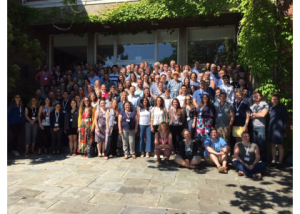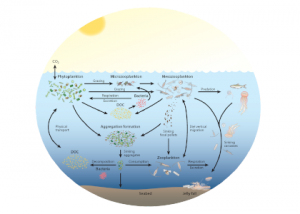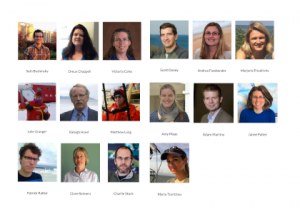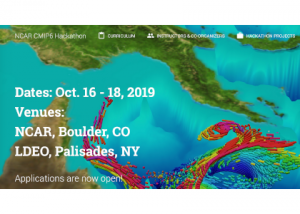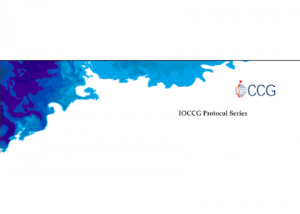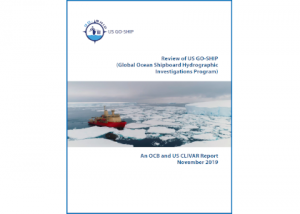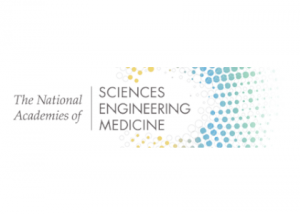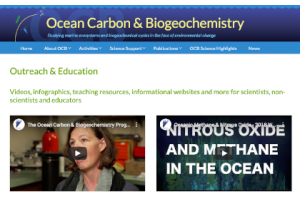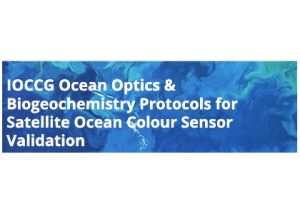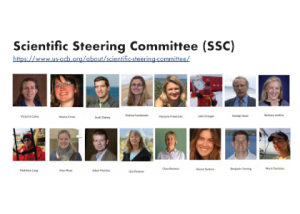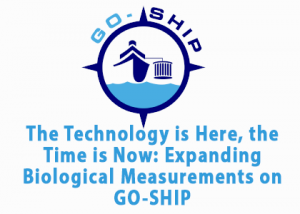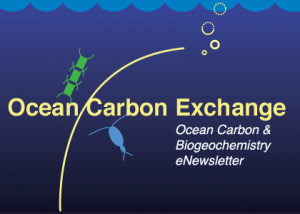Laying the foundation for a potential future BioGeoSCAPES program: Assessing needs and capabilities for studying controls on ocean metabolism through integrated omics and biogeochemistry PIs: Ben Twining, Mak Saito, Alyson Santoro, Adrian Marchetti, Naomi Levine Dates/Venue: October 14-17, 2020 (Woods Hole, MA). Registration to open May 2020 Learn more
Read MoreThe OCB 2020 Summer Workshop will be held June 22-25 in Woods Hole, MA. Registration will open April 2020. Announcing the OCB2020 plenary topics: BioGeoSCAPES (Chairs: Dreux Chappell, Patrick Rafter, Adam Martiny), *also note BioGeoSCAPES scoping workshop in Oct. 2020 Ocean optics (Chairs: Amy Maas, Maria Tzortziou, Seth Bushinsky) Ocean-based negative emissions technologies (Chairs: Lennart […]
Read MoreOCB’s redesigned Ocean Fertilization website is available at https://web.whoi.edu/ocb-fert/. This website is designed for both non-scientists and scientists as an information clearinghouse for research, policy, media, literature and resources related to iron addition to the ocean. The danger of creating a designer planet by Ken Buesseler (WHOI), The Economist blog post
Read MoreWe would like to thank the OCB community for submitting so many high-quality nominations for the OCB Scientific Steering Committee. Our new SSC members are Charlie Stock (NOAA/GFDL) – interactions between climate and marine ecosystems using global early system models Dreux Chappell (ODU) – molecular microbial ecology, phytoplankton cultivation/physiology, and trace metal biogeochemistry Jaime Palter […]
Read MoreA new NSF supplemental funding opportunity (INTERN) allows students to test out non-academic career paths while in graduate school. PIs can request up to six months of additional support for current graduate students supported on active NSF grants. These supplemental awards allow students to pursue internships that will broaden their professional experience and enable them […]
Read MoreSalinity-based equilibrium constants are widely used to estimate trace element speciation and solve the marine carbonate system. However, this approach is necessarily limited to solutions with seawater stoichiometry. As part of SCOR Working Group 145 and a collaborative NERC/NSF-funded project, we have been developing models that use thermodynamic equilibrium constants, together with activity coefficients, taking […]
Read MoreHuman actions are driving changes in Earth’s atmosphere, ocean, and land surface at unprecedented rates. Fully-coupled Earth system models (ESMs) simulate physical aspects of the climate system, their interactions with terrestrial and marine ecosystems, and biogeochemical cycles. In this sense, ESMs are extremely valuable to understanding and managing planetary-scale human-environment interactions. Over the past few […]
Read MoreFinal versions of two new IOCCG Ocean Optics and Biogeochemistry Protocols are now available on the IOCCG website: Volume 3.0: “Protocols for Satellite Ocean Color Data Validation: In situ Optical Radiometry”. This document provides protocols for the collection, processing and quality assurance of in situ measurements of the apparent optical properties of natural water for the validation of […]
Read MoreNew report available Review of US GO-SHIP (Global Ocean Shipboard Hydrographic Investigations Program) An OCB and US CLIVAR Report (November 2019) In 2018 an external review committee convened to assess US GO-SHIP, an affiliate of international GO-SHIP, which performs global ship-based decadal surveys to collect, document, and store high precision and full depth hydrographic […]
Read MoreConsider nominating yourself or others to this Consensus Study sponsored by NASEM. Note the very fast turnaround for nominations (November 26). The National Academies’ Board on Energy and Environmental Systems invites your nominations for qualified individuals to serve on a new consensus study, Accelerating Decarbonization in the United States: Technology, Policy, and Societal Dimensions. For […]
Read MoreNew Biological Pump from Emma Cavan (Imperial College London) and McCork Studios, which incorporates some key remineralization processes, from this recently published Nature paper. New OA podcast featuring Libby Jewett, founding Director of the Ocean Acidification Program at the National Oceanic and Atmospheric Administration (NOAA). Topics discussed include: Chemistry of ocean acidification Impact on animals […]
Read MoreThe IOCCG sampling and measurement protocols for particulate organic carbon (POC) are now available for public comment until January 20, see these and other protocols open for comment.
Read MoreOCB is seeking nominations for new US-based Scientific Steering Committee (SSC) members, including a new early career SSC member. To qualify for the early career slot, a nominee must have completed a PhD within the last 4 years; both postdoctoral researchers and faculty members are eligible. For the early career nominees who are currently postdocs, […]
Read MoreThe oceanographic community has made great strides over the past couple of decades in developing physical and biogeochemical observing capacity. However, a more holistic understanding of marine ecosystem function and change will require more large-scale, sustained ocean biological and ecological observations. The time for such an integrated approach is now. With new instruments and sensors, […]
Read MoreFind jobs, funding and student opps, read news from the OCB Project Office, community and partner organizations, view upcoming meeting and deadlines and more in the Ocean Carbon Exchange eNewsletter. Read the latest issue and sign up here. Please send announcements to ocb_news@whoi.edu.
Read More


